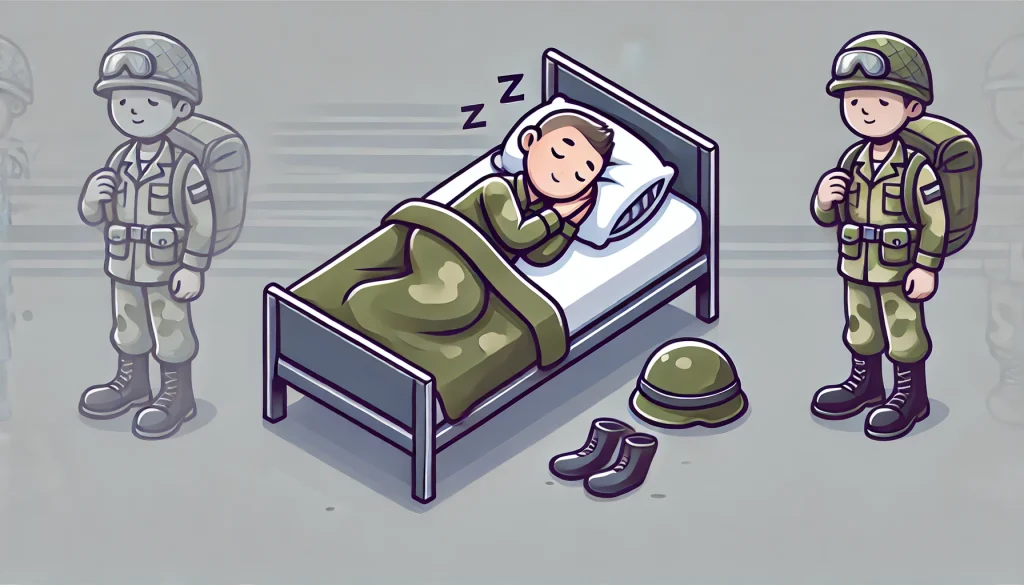Sleep apnea is a prevalent sleep disorder affecting millions of individuals, including veterans.
It is characterized by intermittent pauses or shallow breathing during sleep, lasting from seconds to minutes and occurring multiple times throughout the night. This disruption in breathing patterns can result in poor sleep quality and various health complications, such as fatigue, daytime drowsiness, and elevated risks of cardiovascular diseases and stroke.
Veterans are particularly susceptible to sleep apnea due to their military service experiences. Factors contributing to the development of sleep apnea in veterans include exposure to loud noises, traumatic brain injuries, and post-traumatic stress disorder (PTSD). The military lifestyle, characterized by irregular sleep schedules and high-stress environments, further increases the risk of developing sleep apnea.
Consequently, many veterans continue to struggle with sleep apnea symptoms long after their service has ended. Sleep apnea can significantly impact a veteran’s quality of life. Symptoms may impair concentration, affect mood and mental health, and reduce the ability to perform daily tasks.
In severe cases, sleep apnea can pose life-threatening risks. Given the potential consequences of sleep apnea on veterans’ well-being, it is crucial for those affected to seek appropriate support and resources to manage their condition effectively.
Key Takeaways
- Sleep apnea is a common sleep disorder among veterans that can lead to serious health issues such as heart disease and diabetes.
- The VA disability rating system evaluates the severity of sleep apnea and its impact on a veteran’s daily life and ability to work.
- Veterans can apply for VA disability benefits for sleep apnea by submitting a claim with medical evidence of their diagnosis and symptoms.
- During the VA disability rating process, veterans can expect to undergo medical examinations and provide additional evidence to support their claim.
- The VA disability calculator takes into account the severity of sleep apnea and other service-connected disabilities to determine the overall disability rating.
Need Some More Help with your VA Disability?
Learn more about the VA Disability process and get help with our VA Disability Chatbot programmed and trained by AI

Understanding the VA Disability Rating System
How Disability Ratings Are Determined
These percentages range from 0% to 100%, with 100% being the most severe. When it comes to sleep apnea, the VA uses a specific set of criteria to determine the disability rating. The severity of sleep apnea is typically assessed based on the frequency and severity of breathing interruptions during sleep, as well as the impact of the condition on the veteran’s daily functioning.
Factors Considered in Sleep Apnea Disability Ratings
The VA will also consider any related symptoms, such as daytime sleepiness or fatigue, when determining the disability rating for sleep apnea.
Why Understanding the VA Disability Rating System Matters
It’s important for veterans to understand how the VA disability rating system works so that they can effectively advocate for themselves and ensure they receive the compensation they deserve. By understanding the criteria used to assess disabilities, veterans can provide the necessary evidence and documentation to support their claims for disability benefits.
Sleep Apnea VA Disability Ratings
The VA rates sleep apnea under Diagnostic Code 6847 and assigns disability ratings based on the severity of the condition and how it’s treated. Here are the VA disability ratings for sleep apnea:
100% Rating
- Chronic respiratory failure with carbon dioxide retention or cor pulmonale (right heart failure).
- Or, requires a tracheostomy (a surgical procedure to create an opening in the neck for breathing).
50% Rating
- Requires the use of a continuous positive airway pressure (CPAP) machine or similar device.
30% Rating
- Persistent daytime hypersomnolence (excessive daytime sleepiness).
0% Rating
- Diagnosed with sleep apnea, but the condition does not cause symptoms severe enough to warrant a compensable rating.
Important Factors to Consider:
- CPAP Machine: The 50% rating is commonly assigned for veterans who require a CPAP machine to manage their sleep apnea. This is the most frequent rating for sleep apnea claims.
- Diagnosis: A formal diagnosis of sleep apnea is required, often confirmed through a sleep study. If you have been diagnosed and require a CPAP machine or suffer from significant symptoms, you may qualify for a rating.
- Secondary Conditions: Sleep apnea can also lead to secondary conditions, such as hypertension, depression, heart disease, and obesity, which may increase your overall VA disability rating.
If you believe your sleep apnea is related to your military service or has worsened due to service-connected conditions, it’s important to include thorough documentation in your claim, such as medical records and sleep studies.
How to Apply for VA Disability Benefits for Sleep Apnea

Applying for VA disability benefits for sleep apnea involves several steps. The first step is to gather all relevant medical records and documentation related to the diagnosis and treatment of sleep apnea. This may include records from military service, as well as any private medical records from after leaving the service.
It’s important to provide as much detail as possible about the symptoms and impact of sleep apnea on daily life. Once all necessary documentation has been gathered, veterans can submit a claim for disability benefits through the VA’s online portal, by mail, or in person at a regional VA office. When submitting a claim for sleep apnea, it’s important to clearly outline how the condition is connected to military service and provide evidence to support this connection.
This may include statements from healthcare providers, buddy statements from fellow service members, and any relevant medical test results. After submitting a claim, veterans can expect to undergo a medical examination by a VA healthcare provider. This examination will help to determine the severity of the sleep apnea and its impact on daily functioning.
Following the examination, the VA will review all evidence and documentation provided by the veteran before making a decision on the disability claim.
What to Expect During the VA Disability Rating Process
The VA disability rating process for sleep apnea involves several steps. After submitting a claim for disability benefits, veterans can expect to undergo a medical examination by a VA healthcare provider. During this examination, the healthcare provider will assess the severity of the sleep apnea and its impact on daily functioning.
It’s important for veterans to be prepared for this examination and to provide as much detail as possible about their symptoms and how they affect their daily life. Following the medical examination, the VA will review all evidence and documentation provided by the veteran, including medical records, test results, and statements from healthcare providers and fellow service members. The VA will use this information to determine the severity of the sleep apnea and its impact on the veteran’s ability to function in daily life.
Once all evidence has been reviewed, the VA will make a decision on the disability claim. This decision will include a disability rating for sleep apnea, which will determine the amount of compensation the veteran is eligible to receive. If the claim is approved, veterans can expect to receive regular payments from the VA to help support them as they manage their condition.
How the VA Disability Calculator Works
The VA disability calculator is a tool that helps veterans estimate their potential disability compensation based on their disability rating. The calculator takes into account the severity of the disability and provides an estimate of monthly compensation payments from the VThe amount of compensation a veteran receives is based on their disability rating, with higher ratings resulting in higher compensation payments. The VA Disability Calculator uses a formula that takes into account the veteran’s disability rating and any dependents they may have.
The calculator provides an estimate of monthly compensation payments based on this information. It’s important for veterans to use this tool to get an idea of what they may be eligible to receive in disability compensation. It’s important to note that the VA disability calculator provides only an estimate of potential compensation payments.
The actual amount of compensation a veteran receives will be determined by the VA based on their disability rating and individual circumstances. However, using the calculator can help veterans understand what they may be eligible for and plan accordingly.
Tips for Maximizing Your VA Disability Rating for Sleep Apnea

Gathering Relevant Medical Records
It is essential to collect all relevant medical records and documentation related to the diagnosis and treatment of sleep apnea. This includes records from military service, as well as any private medical records from after leaving the service.
Providing Supporting Statements
In addition to medical records, it can be helpful to provide statements from healthcare providers that detail the severity of the sleep apnea and its impact on daily functioning. These statements can provide valuable evidence to support a higher disability rating. Similarly, buddy statements from fellow service members can help to establish a connection between sleep apnea and military service.
Preparing for the Medical Examination
It’s also crucial for veterans to be prepared for their medical examination by a VA healthcare provider. Providing as much detail as possible about symptoms and how they affect daily life can help ensure an accurate assessment of the severity of the sleep apnea. By following these tips, veterans can increase their chances of receiving a higher disability rating for sleep apnea.
Resources for Veterans with Sleep Apnea and VA Disability Ratings
For veterans with sleep apnea and VA disability ratings, there are several resources available to provide support and assistance. The VA offers a range of healthcare services specifically designed to help veterans manage their sleep apnea, including access to CPAP machines and other treatments. Veterans can also access mental health services through the VA to address any related symptoms such as anxiety or depression.
In addition to healthcare services, there are also support groups and organizations that provide resources and assistance specifically for veterans with sleep apnea. These groups can offer valuable information and support from others who have experienced similar challenges. Veterans may also be eligible for vocational rehabilitation services through the VA to help them re-enter the workforce or pursue new career opportunities.
Finally, veterans with sleep apnea may be eligible for additional benefits and support through other programs offered by the VThis may include assistance with housing, education benefits, or financial support for dependents. By taking advantage of these resources, veterans can access the support they need to manage their condition and improve their quality of life. In conclusion, sleep apnea can have a significant impact on veterans’ lives, affecting their health and daily functioning.
Understanding how to navigate the VA disability rating system and apply for benefits is crucial for veterans with sleep apnea. By utilizing available resources and following best practices for maximizing their disability rating, veterans can access the support they need to manage their condition and improve their quality of life.
